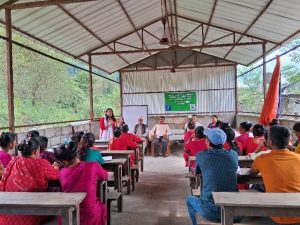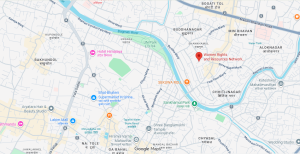 The training on governance, gender issues, GESI leadership and roles and responsibilities to Community Forest User Groups (CFUGs) based on the RBA plan developed was conducted on October 8 and 9, 2025 in Bungdal CFUG. The training in Bungdal CFUG was conducted for two days where first day emphasized on the clarification of terms and the content deliverables whereas second day focused on Right Based Advocacy (RBA) Plan preparation. The training was developed based on the Right-Based Advocacy (RBA) plan, which aims to enhance community engagement and promote sustainable forest management practices.
The training on governance, gender issues, GESI leadership and roles and responsibilities to Community Forest User Groups (CFUGs) based on the RBA plan developed was conducted on October 8 and 9, 2025 in Bungdal CFUG. The training in Bungdal CFUG was conducted for two days where first day emphasized on the clarification of terms and the content deliverables whereas second day focused on Right Based Advocacy (RBA) Plan preparation. The training was developed based on the Right-Based Advocacy (RBA) plan, which aims to enhance community engagement and promote sustainable forest management practices.
DAY-1
The training was attended by 30 participants, including members of the CFUG’s Executive Committee, the Enterprise Group, representatives from WRRN, and the facilitators. The session began with a warm welcome and introductions led by Mrs. Kabita Gaire, who explained the purpose of the gathering and gave an overview of the day’s planned activities.
After the introduction, participants took turns introducing themselves, fostering a sense of collaboration and setting a positive atmosphere before officially starting the program. Ms. Bharati Pathak took the stage to begin the session by explaining the concept of rights, their significance, and how they shape our lives. To make the session interactive and engaging, she introduced a participatory activity where participants were asked to list various rights they were familiar with.
The discussion brought forward a rich variety of rights, including the right to food, right to life, right to education, right to freedom of speech, right to equal opportunities, children’s rights, women’s rights, right to property, right to justice, right to freedom, right to travel, rights of senior citizens, and even the right to participate in community forest user groups (CFUGs). This activity helped participants recognize and articulate their understanding of fundamental rights, sparking meaningful reflections on how these rights relate to their everyday lives. The interactive game fostered active participation and engagement, creating an open and dynamic environment.
The training began with Mr. Ghanshyam Pandey introducing the core principles of good governance in the context of community forest management. He explained that good governance involves practicing transparency, accountability, inclusivity, and adherence to legal frameworks to ensure equitable participation and informed decision-making within the community. These principles, he emphasized, are fundamental to achieving effective forest management and ensuring long-term community benefits.
The session delved into each of these principles, starting with transparency. Participants were guided on the importance of maintaining open communication within Community Forest User Groups (CFUGs), particularly regarding financial transactions. Examples included sharing details about income from timber sales and budget allocations to build trust and foster collective understanding among members. Accountability was also discussed, with participants examining how each CFUG member holds specific roles and responsibilities. Leaders were encouraged to regularly update members on their activities to maintain alignment with the community’s interests.
Inclusivity was another critical focus, highlighting the importance of ensuring participation from all groups, especially women, marginalized communities, and indigenous populations. Participants identified common barriers preventing these voices from being heard and brainstormed actionable strategies to create a more welcoming and participatory environment within CFUGs.
Additionally, the session reviewed the 31 rights guaranteed under Nepali policies, underscoring their significance for CFUG operations. Mr. Pandey emphasized balancing rights with responsibilities, noting that while rights empower individuals, responsibilities ensure equity and sustainability in forest management.
The discussion also touched on gender issues, where Mr. Pandey shared an international example of challenges faced by men in custody battles during divorces. He explained how such issues have led to advocacy movements aimed at addressing perceived inequities. This example served to illustrate that discrimination exists globally but manifests differently depending on societal contexts.
The conversation then shifted to the specific challenges women face in CFUG activities, with participants sharing personal experiences. Issues such as limited decision-making power and cultural constraints were brought to light. Together, the group brainstormed practical solutions to make CFUGs more inclusive and supportive, ensuring equal participation and meaningful engagement for everyone regardless of gender.
By the end of the day, attendees gained a clearer understanding of how the principles of good governance could be applied within their CFUGs. The discussions and activities helped them envision improved decision-making processes and promoted social equity in the management of forest resources.
DAY-2
On the second day of our training, we focused on Gender Equality and Social Inclusion (GESI) leadership, emphasizing the roles and responsibilities of Community Forest User Group (CFUG) members. Ms. Aarati Pathak led an engaging session that began with a thought-provoking activity where participants listed household chores typically performed by men and women over a 24-hour period. The results were illuminating; it became evident that women often bear a heavier workload yet still manage to engage in self-development and community activities. This realization sparked meaningful discussions about the significant but frequently overlooked contributions of women, highlighting the necessity to openly acknowledge and value their efforts.
The session underscored the essence of inclusive leadership, which ensures that every individual, regardless of gender or social status, has their voice heard and perspectives valued. Ms. Pathak shared inspiring examples of leaders who have successfully embraced diversity within their CFUGs, prompting participants to reflect on their own leadership practices. Attendees discussed various challenges they face and brainstormed ideas to empower women and marginalized groups to take on leadership roles. Practical suggestions emerged, such as establishing mentorship programs and rotating leadership positions, which could make leadership more accessible and inclusive.
We also delved into the specific responsibilities of CFUG members, focusing on sustainable forest management, monitoring resource use, and implementing conservation strategies while adhering to legal frameworks. The discussions highlighted the importance of inclusive decision-making in these processes, demonstrating how diverse perspectives can lead to better outcomes for both the community and the forest. Participants shared insights about their roles and responsibilities, enhancing their understanding of how to balance conservation efforts with equitable resource use within their CFUGs.
By the end of the day, a palpable sense of purpose and optimism filled the room. Participants left feeling more equipped to lead with inclusivity at the forefront of their minds, inspired to build stronger and more equitable communities through their CFUGs


